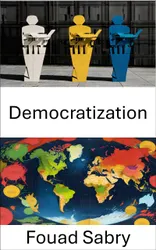Unlock the profound significance of International Legal Theories within Political Science with this comprehensive guide. Gain insights into the legal principles that shape global governance and justice, enhancing your expertise in this critical field.
Chapters Summaries:
1. International Legal Theories - Explore foundational and contemporary theories in international law and their impact on global legal norms.
2. Jurisprudence - Examine the philosophical foundations of law and their influence on international legal frameworks.
3. Philosophy of Law - Discover theoretical perspectives guiding the interpretation and application of legal principles across borders.
4. Legal Positivism - Understand the doctrine that laws are human-made rules and its implications for international legal systems.
5. Peremptory Norm - Learn about the highest, non-violable norms in international law, like prohibitions against genocide and torture.
6. Regime Theory - Investigate how international regimes manage global issues through legal and institutional frameworks.
7. Reflectivism - Examine the critical approach to international law, focusing on the social and political contexts shaping legal norms.
8. History of International Law - Trace the evolution of international law from its origins to present-day principles.
9. International Law - Get an overview of rules and principles governing relations between states and other international actors.
10. Legal Anthropology - Analyze how legal systems reflect societal norms and values.
11. Crime - Study international legal frameworks addressing transnational crimes and efforts to combat them.
12. Civil Liberties - Understand the protection of individual rights within international law.
13. Chinese Law - Examine Chinese legal traditions and their impact on international interactions.
14. International Relations - Analyze how international law influences global diplomacy.
15. International Human Rights Law - Investigate mechanisms designed to protect human rights globally.
16. Enforcement - Learn about methods and challenges in enforcing international legal norms and agreements.
17. Humanitarian Intervention - Discuss legal and ethical considerations of using force to protect human rights.
18. Constructivism (International Relations) - Understand how ideational factors shape international law.
19. English School of International Relations Theory - Explore contributions to the understanding of international society and legal order.
20. Abram Chayes - Learn about this influential legal scholar's contributions to international law.
21. Right to Truth - Delve into the emerging principle that victims and society have the right to know the truth about human rights violations.
Ideal for professionals, students, and enthusiasts, this book provides advanced knowledge, ensuring you stay ahead in the field of international law.
























